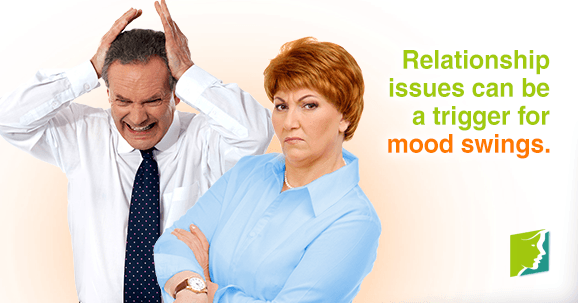Mood swings can make you feel like you're on an emotional roller coaster: one moment you're at the top of the track, the next you're plunging downwards at break-neck speed. You may feel like you've lost control, and have no idea which direction you'll be traveling in next. But what causes mood swings and how can you treat them? Read on to find out.
Flip of the Switch: What's Behind My Mood Swings?
Mood swings are most commonly triggered by imbalanced hormone levels. Progesterone and estrogen hormones are responsible for regulating the female functions and processes as they produce serotonin by increasing serotonin receptor sensitivity. Thus when hormone levels drop, so do serotonin levels. Scientists believe that these altering hormonal reactions might be responsible for the occurrence of mood swings.
In addition to hormonal causes, mood swings can be triggered by a myriad of psychological, behavioral, and health factors. Some of these factors include:
- History of mental illness
- Stress
- Relationship issues
- Coping with change
- Smoking
- Alcohol
- Poor diet
- Sleep disorders
- Thyroid disease
- Diabetes
Leveling Out
Women who suffer from mood swings as the result of hormonal factors should try making simple lifestyle and dietary changes. Most experts recommend that women should engage in a cardiovascular activity such as running or walking to increase the production of mood-enhancing endorphins. In addition, they should avoid caffeine, alcohol, and chocolate, which increase chances of irritability, anxiety, and depression.
In addition to these lifestyle changes, many women opt to take herbal supplements to help balance their hormone levels. Most of these herbs contain phytoestrogens, plant-based estrogens, that mimic the role of estrogen when introduced into the female body. Herbs like ginkgo biloba and dong quai for example, treat hormone imbalance by blocking estrogen when levels are too high or replacing estrogen when levels are too low. Herbs are generally considered a safe natural alternative to hormone replacement therapy (HRT).
Recommendation
While mood swings are a common symptom of menopause, PMS, or pregnancy in women, they could also be a sign of something more serious. If you're suffering from prolonged periods of depression, anxiety, or irritability, it's always best to consult a healthcare professional. Click here to read more about extreme cases of mood swings.
Sources
- "Adult Mood Swings". The Health Center. www.thehealthcenter.info.
- Dr. Love, Susan, and Karen Lindsey. Dr. Susan Love's Menopause and Hormone Book. New York: Three Rivers Press, 2003.
- Amin, Zenab, Turhan Canli, and C. Neill Epperson. "Effects of Estrogen-Serotonin Interactions on Mood and Cognition". Behav Cogn Neurosci Rev 2005; 4; 43.
- "Estrogen Promotes Gender Difference in Brain's Response to Stress". Molecular Psychiatry. www.psycheducation.org.




